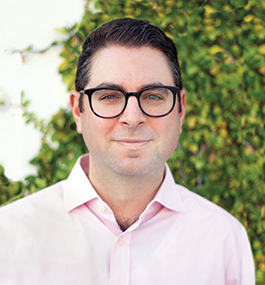When Neurodivergence Doesn’t Mean Isolation

David Markman
Jeremy Hamburgh ’04
The very act of socializing is an expression of social justice, says Jeremy Hamburgh ’04. This is especially true for people with autism, who are more vulnerable to social anxiety and loneliness.
It’s why, in 2010, this former Bronx prosecutor began the business that would become My Best Social Life, which provides coaching to young adults with autism to help them meet others and find friendship, love, or community.
While attending Shabbat dinners hosted by his synagogue, Hamburgh saw people who were having trouble mingling and making small talk. An affable guy, he felt he could help. He read up on how feelings of attraction, body language, and social cues affect the brain. He taught classes through his Jewish Community Center on what he’d learned. He even hosted recurring date nights. He knew that some who struggled socially had autism, so he collaborated with local neurodiversity organizations.
After he started My Best Social Life, he kept working as a lawyer, even as his coaching took up more and more of his time. Then one of his clients got engaged and requested that Hamburgh give a blessing at the wedding ceremony.
“That’s when I thought, I don’t want to look back on my life and think about the trials I’ve won,” Hamburgh says. “I want to think about the weddings I’ve been a part of, the relationships, the friendships.”
In 2021, he left his law career to coach full time. Today, he views My Best Social Life as a calling. “I want to reframe rejection so people understand that some people just may not need you in their life,” he says. “It’s about finding the people who do, because, for many, isolation can be a matter of life and death.”
Clients who turn to My Best Social Life start by describing their goals for their social and dating life, and the challenges they’ve faced. Leaning on academic research, Hamburgh helps them devise a plan for developing relationships with others and connects them with program alumni who offer additional support.
“The right strategy is half the equation,” Hamburgh says. “The other half is mindset. When clients cross that bridge of fear and say, ‘I’m going to put in the effort,’ and we introduce them to our online community, immediately they’re getting messages from Texas, New York, and Australia. It’s like, ‘Welcome. You’re in the right place.’”
Hamburgh, whose father, Mark ’72, P’04, P’07, and sister, Michelle Cohlan ’07, also attended Brandeis, says the friendships he made as a student helped him understand the importance of human connection.
“The people I love and reach out to daily, we know one another at a deep, elemental level,” he says. “I want to help people with autism discover they can connect with others the same way.
“This is going to be my life’s work. I can’t think of a more Brandeisian pursuit.”
— David Eisenberg
